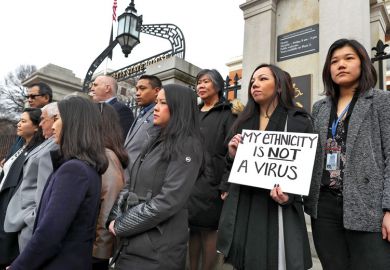International students across Europe have been left in confusion over their exchange grants, not been given psychological and social support by their universities and, in some cases, have been discriminated against because of their nationality, according to a survey assessing the impact of coronavirus.
Around a quarter have had their exchanges cancelled, although for two-thirds of students they are continuing, according to Student Exchanges in Times of Crisis, a survey of more than 20,000 students by the Erasmus Student Network conducted from 19 to 30 March.
With transport links ruptured and borders suddenly erected across Europe, 4 per cent of students said they were stuck abroad, unable to return home, although fewer reported being trapped in place as March progressed.
About 15 per cent said they had found it impossible to find transport home. “My home country closed the border in two days, and I needed to borrow money to buy flight tickets home, because one flight was cancelled, and the available tickets were crazy expensive,” one Latvian student said.
Meanwhile, 8 per cent of students said that the pandemic has meant that they are unable to start their exchange.
Two-thirds of international students are still unclear about what will happen to their exchange grants. Seven per cent of students have been told they will have to return all this money, despite many having already run up costs. “I’ve received information from my sending institution that I’d have to return all the scholarship. However, I had expenses for the accommodation, food and transport here,” one Bulgarian student said.
The results reveal that three-quarters of students have received academic support during the pandemic – but on other measures related to well-being they are being less well looked after.
Only a third reported receiving “social” support, be it from their home or host university, or family and friends. Even fewer reported receiving psychological, logistical, linguistic or medical support, either from their university or elsewhere. About 15 per cent said they had not received any support at all.
As for teaching, for the vast majority of students, physical lectures have been cancelled and moved partially or entirely online. This has taken a psychological toll on some. “One of the most important reasons for me to attend this Erasmus programme was to find new friends around the world and socialise with them,” reported one student. “But, due to isolation, I cannot do that now. I am very disappointed and because of that I feel very depressed.”
The virus also appears to have led to an upsurge in racism against students from regions first hit by the pandemic. Almost a quarter of Italian students and around a fifth of Asian students said they had been the victims of discrimination based on their nationalities.
“In these two weeks I always felt like somebody watching me, as if I were corona-infected person just because I’m Asian. I was sprayed [with] disinfection sprays at station, which made me really sad feeling,” one Japanese student said.
The network surveyed close to 22,000 students from 19 to 30 March. The vast majority of respondents were from Europe.
Register to continue
Why register?
- Registration is free and only takes a moment
- Once registered, you can read 3 articles a month
- Sign up for our newsletter
Subscribe
Or subscribe for unlimited access to:
- Unlimited access to news, views, insights & reviews
- Digital editions
- Digital access to THE’s university and college rankings analysis
Already registered or a current subscriber?








